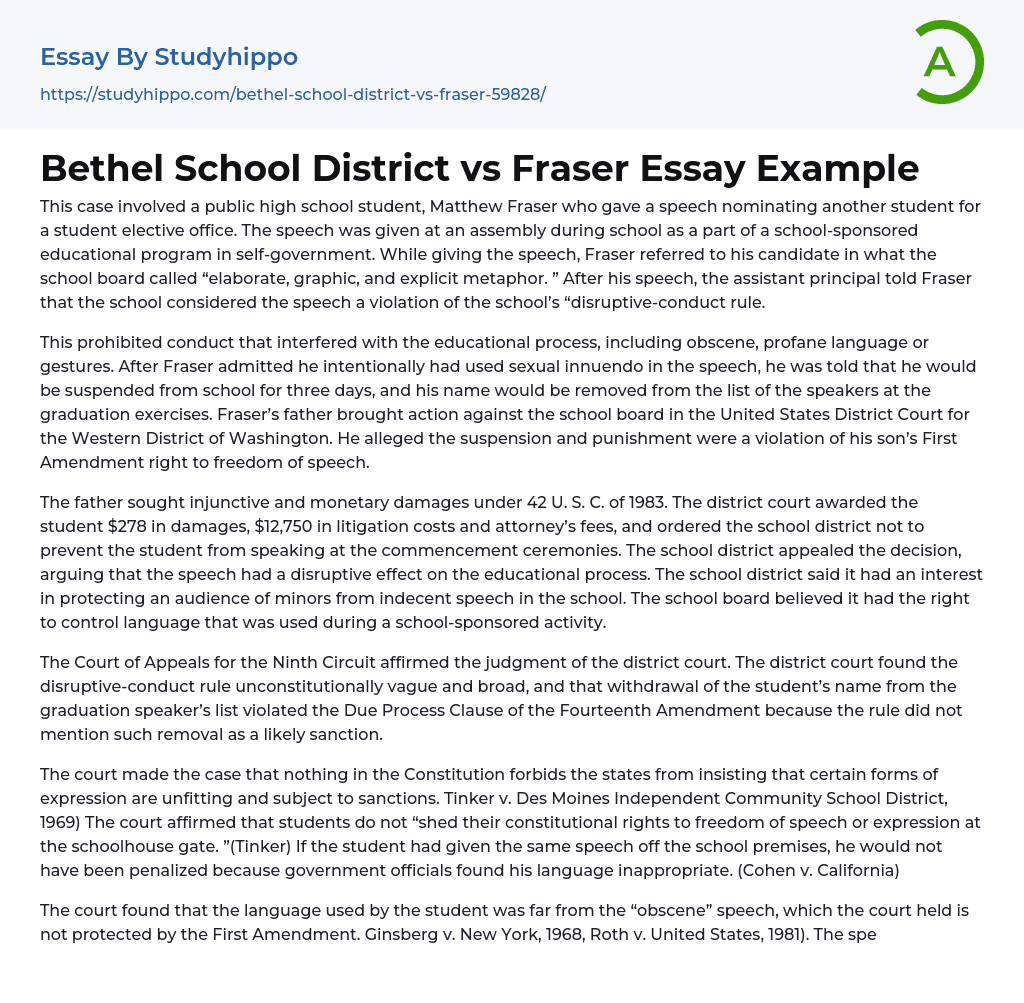During a public high school assembly, Matthew Fraser, a student, gave a speech endorsing another student for a student elective office. This speech was part of the school's educational program on self-government. However, Fraser used what the school board considered to be an "elaborate, graphic and explicit metaphor" to describe his candidate. As a result, the assistant principal informed Fraser that his speech violated their rule against disruptive conduct.
Fraser delivered a graduation speech containing inappropriate language and sexual innuendo, resulting in disciplinary measures such as a three-day suspension and exclusion from future speaking engagements. Consequently, Fraser's father filed a lawsuit against the school board, claiming that these actions infringed upon his son's First Amendment right to freedom of speech.
The father initiated a legal action to request both injunctive relief and monetary compensation under 42 U.
...S. C. of 1983. The district court ruled in favor of the student, providing $278 in damages, as well as $12,750 in litigation costs and attorney's fees. Additionally, they directed the school district to permit the student to deliver a speech at the commencement ceremonies without any obstruction. The school district challenged this decision by filing an appeal, arguing that the speech disrupted education and assuming responsibility for safeguarding underage audiences from inappropriate language on school premises. Furthermore, they claimed their authority to regulate language used during any activities associated with the school.
The district court's decision to uphold the disruptive-conduct rule as unclear and excessively broad was affirmed by the Ninth Circuit Court of Appeals. Moreover, the student's rights under the Due Process Clause of the Fourteenth Amendment were violated when their name was removed from the graduation speaker list
This violation occurred due to a lack of specificity in the rule regarding removal as a consequence.
The court's ruling affirms that states have the power to consider certain forms of expression inappropriate and subject to punishment, even without any constitutional prohibition. In Tinker v. Des Moines Independent Community School District (1969), the court upheld students' rights to freedom of speech and expression while on school grounds. It was pointed out that if the same speech had occurred off campus, the student would not have been penalized for using language deemed unsuitable by government officials (Cohen v. California).
The court determined that the student's speech did not qualify as "obscene" speech, which is not protected by the First Amendment. This decision referenced previous cases such as Ginsberg v. New York (1968) and Roth v. United States (1981). Additionally, it concluded that the speech did not disrupt education. The school district lacked evidence to prove any disturbance caused by the speech in relation to education. The Court of Appeals for the Ninth Circuit supported this conclusion and emphasized that there were no school disciplinary rules prohibiting such speech.
Although the court of appeals did not discover any proof that students were truly offended by a sexual metaphor utilized in the speech, there remained a possibility for offense in specific circumstances. Consequently, the case was escalated to the Supreme Court where it was concluded that students' rights in public school vary from those of adults in different settings. The Supreme Court additionally deemed Fraser's speech offensive towards both teachers and students, particularly teenage girls.
The First Amendment gives school officials the authority to determine what speech is deemed vulgar and lewd,
which is important for fostering a productive learning environment and maintaining discipline for disruptive behavior. While school disciplinary rules do not need to be as comprehensive as criminal laws, they can still enforce disciplinary actions. In the 1974 case of Arnett v. Kennedy, the student had been duly warned about the potential consequences of his speech. The ruling by the Ninth Circuit Court of Appeals was subsequently overturned.
- Jurisprudence essays
- Social Injustice essays
- Juvenile Justice essays
- Business Law essays
- Contract essays
- Consumer Protection essays
- Property essays
- Ownership essays
- Agreement essays
- Common Law essays
- Contract Law essays
- Justice essays
- Security essays
- Tort Law essays
- United States Constitution essays
- Crime essays
- Lawsuit essays
- Treaty essays
- Family Law essays
- Marijuana Legalization essays
- Constitution essays
- War on Drugs essays
- Court essays
- Jury essays
- Police essays
- Protection essays
- Community Policing essays
- Criminal Law essays
- Judge essays
- Lawyer essays
- Employment Law essays
- Copyright Infringement essays
- Injustice essays
- Intellectual Property essays
- Breach Of Contract essays
- Internet Privacy essays
- Cyber Security essays
- Bill Of Rights essays
- Civil Liberties essays
- First Amendment To The United States Constitution essays
- Fourth Amendment To The United States Constitution essays
- Second amendment essays
- Animal Cruelty essays
- Law Enforcement essays
- Juvenile Justice System essays
- Surveillance essays
- Forensic Science essays
- Crime Prevention essays
- Criminal Justice essays
- Criminology essays




